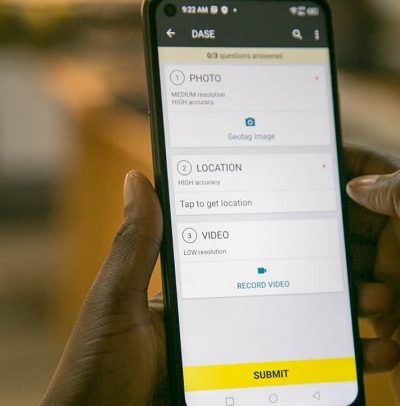A smartphone app which allows canoe fishers to gather information which they can present as evidence of illegal fishing practices has been launched.
The app, DASE, which means ‘evidence’ in the Fante language, provides a simple, user-friendly interface which can also be used to alert authorities about an industrial vessel fishing illegally in the exclusion zone reserved for artisanal canoes.
The app can also be used to help fishers who have had their canoes or gear destroyed to claim damages from the perpetrators.
Developed by the Environmental Justice Foundation (EJF) and Hen Mpoano under the EU-funded Far Dwuma Nkodo project, DASE’s over all aim is to help fisher folks rid Ghanaian waters of illegal fishing that threatens their livelihoods.
Canoe fishers who have the app installed on their phones can simply take a photo of an illegal fishing vessel with its name or identification number showing, using the app. Although extra information can be added to the report, such as a video, all that is needed is a photo and location, which can be logged quickly and easily at sea.
The app will then upload the report to a central database where the evidence can be used by the Fisheries Commission to arrest and sanction the perpetrators.
The Far Dwuma Nkodo project has already engaged over 700 fishers across 48 communities in Ghana’s Central Region as well as worked closely with the Fisheries Commission to train fisher folks and government staff on how to use the app.
Executive Member of the Ghana National Canoe Fishermen Council (GNCFC) Nana Jojo Solomon, said: “Illegal fishing is causing the collapse of Ghana’s staple fish stocks and the loss of food security, livelihoods and tens of millions of dollars in national revenue. This app means canoe fishers no longer have to stand by while industrial vessels fish illegally in their fishing grounds.”
Executive Director of EJF Steve Trent said: “By providing cheap, readily available and locally appropriate technologies we are able to empower fishing communities to take action to protect the environment and resources which they depend on.”
By Jamila Akweley Okertchiri


